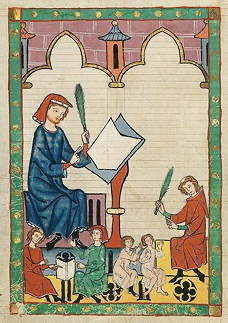ANewCatechism

Master of the Codex Manesse:
Codex Manesse, fol. 292v,
"The Schoolmaster of Esslingen"
Der Schulmeister von Eßlingen)
(between 1305 and 1340)
" … reliably vanquishing dragons since before St. George."
How has the study and exposition of my Fambly's history changed me? It's probably too early in the transformation process to meaningfully begin to describe how I might have changed. I'll admit to feeling as though I'm changing without suggesting that I might know just how I will eventually be changed. I carry a strong sense of before and of since, of my understanding of my world having significantly shifted as a result of my recent discoveries. I plan to continue my studies to delve deeper into the histories that had previously escaped relevance. Suddenly, I'm curious about the late Middle Ages now that I have names, dates, and even some detailed personality sketches with which to personally relate. History's no longer just dates but personal causes and effects, real consequences, a present source of vanity, pride, and perhaps even more profound understanding. I seem to have acquired a greater stake in relating to the past.
I imagine future generations teaching their children this essential context, such that they might be able, as I have noticed myself suddenly able, to name my forebears in reverse sequence. I have been catching myself trying to remember, as I might attempt to recall a set of lyrics, the order of recession, the procession backward through what I think of as modern times, back into and through The Middle Ages, and with some threads, even back into and even through the Dark Ages and into genuinely ancient times. To imagine those connections renders me relatively breathless and mindful of what my presence has cost in terms of forebears. I was not a mere accident; I represent something of genuine consequence, and my progeny seems no less sacred if I might think of my Fambly as maybe my most holy context.
I can suddenly see more clearly where I have failed to encourage and protect my Fambly. As I mentioned in earlier installments, there have been times when my Fambly seemed to be my most prominent source of embarrassment. I have disappeared for years, either in exile or distracted in blind pursuit, alive but out of my essential context. How can anyone tell that they're related to anyone else? Relations are unchosen associations. They're not friends and not necessarily enemies, but dealt to each without their agreement or assertion. They are freely given and only in need of acceptance and recognition. Whatever else you might be to each other, you first remain relation. All other attributes follow.
I see now that much of my previous life rang unnecessarily hollow. I didn't know where I came from, so I had no deep sense of who I was. I imagined that I needed to imagine who I was rather than discover some essential context. I thought I needed to create my identity from almost nothing rather than build upon my substantial inheritance. Even if I couldn't quite imagine my forebears influencing who I might become, their experiences might have served as meaningful examples of how someone perhaps very like myself coped with the eternal, universal dilemmas everyone faces. Had I known the stories of the challenges overcome, I might not have felt so overwhelmed when I encountered long division. I might have instead imagined myself encountering my generation's version of a historically-familiar dragon. My Fambly's probably been reliably vanquishing dragons since before St. George. One of my great-grandfathers might have even instructed old George on the finer points of dragon vanquishing.
Here's about half the history I've uncovered so far, just along my paternal grandmother's thread. I expect, with repetitive practice, to be able to recite this lineage from memory. I will do what I can to teach my son and grandchildren ANewCatachism, too.
Edward I Plantagenet (English King) and Eleanor of Castile (my 21st Great-grandparents) bore,
20-
Edward II (English King) married Isabella, daughter of Phillip of France and Joan I of Navarre, and bore,
19-
Edward III (English King) married Phillippa, daughter of William of Hollard, and bore,
18-
John of Gaunt eventually married Katherine Swynford and bore,
17-
John Beaufort married Margaret Hollard, who bore,
16-
Edmund Beaufort married Alinore Beauchamp, who bore,
15-
Jean Beaufort married Robert St. Lawrence, then bore,
14-
Nicolas St. Lawrence married Genet Plunkett, who bore,
13-
Allison St. Lawrence married John Netterville and bore,
12-
Margaret Netterville married Walter Forster and bore,
11-
Margaret Forster married Sir John Dungan and bore,
10-
Thomas Dungan married Jane Rochfort, who bore,
9-
William Dungan married Francis Latham, who bore,
8-
Thomas Dungan married Elizabeth Weaver, who bore,
7-
Sara Dungan married James Carroll and bore,
6-
James Carroll married Diana Van Kirk, who bore,
5-
Rebecca Carrell married Robert Ware and bore,
4-
John Ware married Nancy Moore, who bore,
3-
Jane Ware married Thomas Lovelady and bore,
2-
Elizabeth Lovelady married John Bird Bounds, then bore,
1-
John Armstrong Bounds married Nancy Ann Howell, who bore,
0-
Caroline Nettie Bounds married Daniel Nicholas Schmaltz, then bore,
Robert Clancy Schmaltz married Bonnie Marie Wallace (my Parents), who bore,
David A. Schmaltz (me)
©2024 by David A. Schmaltz - all rights reserved


